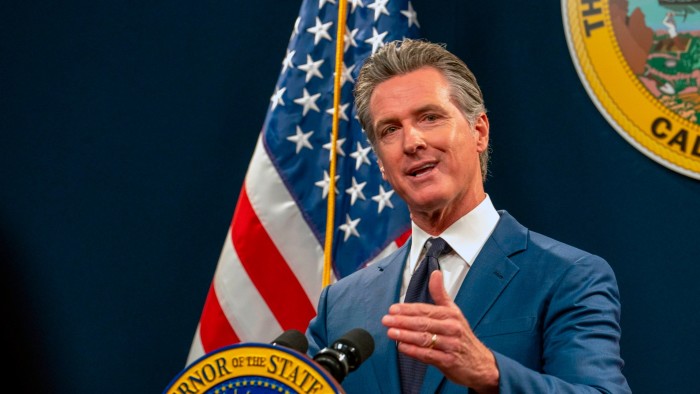Unlock the White House Watch newsletter for free
Your guide to what the 2024 US election means for Washington and the world
California governor Gavin Newsom said that the state will sue to halt Donald Trump’s sweeping tariffs in a move that challenges the US president’s unprecedented use of emergency powers to upend the global trading order.
The lawsuit, which will be filed on Wednesday by Newsom and state attorney-general Rob Bonta, is the second to challenge Trump’s “reciprocal” tariffs and could lead to a judge curtailing the president’s trade powers.
Trump earlier this month hit the US’s major trading partners with steep “reciprocal” tariffs of up to 50 per cent, before temporarily pausing the higher rates and leaving in place a levy of 10 per cent on most countries.
“President Trump’s unlawful tariffs are wreaking chaos on California families, businesses and our economy, driving up prices and threatening jobs,” Newsom said.
The lawsuit, which will be filed in the District Court for the Northern District of California, asks the court to declare the tariffs imposed by Trump void and block their implementation.
Trump aides proposed several legal mechanisms for applying tariffs, but most other avenues would require the government to produce studies first, which would have led to a slower application of the duties.
Instead, Trump opted to invoke the International Economic Emergency Powers Act of 1977 (IEEPA), which allows the US president to immediately hit trading partners with levies in times of national emergency.
To use the law, the Trump administration declared a national emergency “due to national security and economic security concerns arising from the conditions reflected in large and persistent annual US goods trade deficits”.
The California action follows a lawsuit filed in the US Court of International Trade earlier this week by the Liberty Justice Center on behalf of five small US businesses.
Lawyers in that case have argued that the IEEPA can only be triggered in the case of an “unusual and extraordinary threat” to national security, and say that the US trade deficit “is neither an emergency nor an unusual or extraordinary threat”.
“Trade deficits have existed for decades, and do not constitute a national emergency or threat to security,” the Liberty Justice Center said.
“Moreover, the administration imposed tariffs even on countries with which the US does not have a trade deficit, further undermining the administration’s justification.”
Meanwhile, the California lawsuit argues that IEEPA does not allow the president to apply tariffs, and says that Trump should seek congressional approval to take such “economically significant actions”.
The success of either lawsuit in blocking the US’s “reciprocal” tariffs would represent a major blow to Trump’s trade agenda, although it would not affect sector-specific tariffs on steel, aluminium and autos that the administration has applied by invoking alternative US laws.
Newsom, who was elected governor of California in 2018 and is regarded as a potential future Democratic presidential candidate, said California’s lawsuit was an effort to represent “American families who can’t afford to let the chaos continue”.
According to Newsom’s office, the state is the fifth-largest economy in the world. It is also home to the Port of Los Angeles, which is the busiest in the US and is particularly exposed to a slowdown in trade with China.


